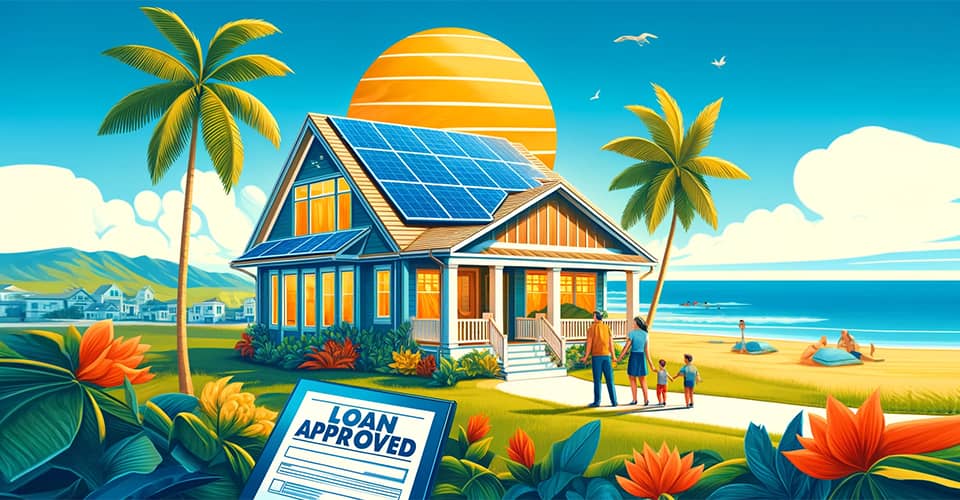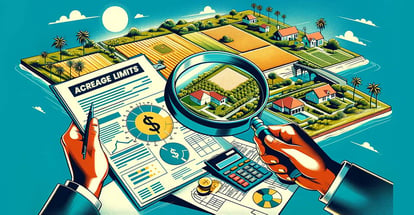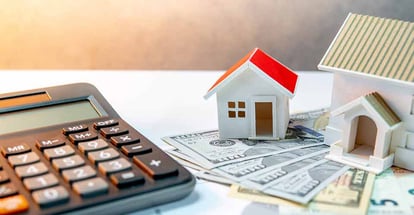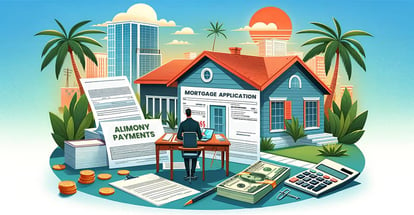What You Need to Know About Loan Approval for a Home With Solar Panels
Hi Phil and Ryan,
I'm looking to buy a home that has solar panels, and I'm feeling lost with all the rules from different agencies like Fannie Mae, Freddie Mac, FHA, VA, and USDA.
There's a lot to think about, like whether the solar panels are leased, part of a PACE loan, or fully owned, and how that affects getting a loan and the home's value.
Can you help me figure out the best way to approach buying a home with solar panels?
Susan S.
Expert Answer: Hi Susan, here's what you need to know about how solar panels affect getting home financing.
How Solar Panels Affect Loan Approval
Solar panel agreements can significantly impact loan approval from agencies like Fannie Mae and Freddie Mac, primarily depending on whether the solar panels are leased, subject to a power purchase agreement (PPA), or owned outright.
Each scenario presents different considerations for loan approval processes:
Leased Solar Panels and PPAs
For homes with leased solar panels or those under a PPA, both Fannie Mae and Freddie Mac have specific requirements that must be met for loan approval.
These guidelines ensure that the presence of leased solar panels or PPAs doesn't adversely affect the financial stability and marketability of the property securing the mortgage.
Fannie Mae
Fannie Mae requires that leased solar panels and PPAs not affect the property's lien priority.
The monthly payments under these agreements must be factored into the debt-to-income (DTI) ratio unless the lease or PPA includes a fixed payment for a guaranteed amount of energy production, which may allow for an exclusion from the DTI calculation.
Additionally, Fannie Mae stipulates that the property must have access to an alternate source of electric power that meets community standards.
Freddie Mac
Freddie Mac similarly emphasizes the need for solar panel lease payments or PPA payments to be considered in the DTI ratio calculations under certain conditions.
The guidelines highlight the importance of a production guarantee to potentially exclude these payments from the DTI ratio.
Freddie Mac also notes that the appraiser must comment on the marketability of the property with solar panels, indicating the significance of solar panels to the overall property value, but leased panels or those under PPAs are not included in the property's appraised value.
Owned Solar Panels
When solar panels are owned outright, the process tends to be more straightforward:
Fannie Mae
Fannie Mae views owned solar panels positively, as they often add to the value of the property.
The guidelines suggest that standard eligibility requirements apply, making the loan approval process smoother for properties with owned solar panels.
Freddie Mac
Freddie Mac requires appraisers to recognize the existence of owned solar panels and consider them in the property's market value, potentially increasing the home's appraisal value.
This can positively affect the loan-to-value ratio, an important factor in loan approval.

FHA Loans for Solar Panel Homes
When applying for an FHA loan for a home with solar panels, the setup of the solar panels matters.
If the panels are leased or under a Power Purchase Agreement (PPA), they won't increase the home's appraised value because they're not permanently part of the home.
However, you'll need to count the monthly payments for these panels in your debt calculations, which could affect your loan eligibility.
On the other hand, if you own the solar panels outright, they can boost your home's value. This is because they're seen as a permanent improvement, potentially making it easier to get your loan approved.
The FHA looks favorably on energy-efficient homes, so owned solar panels could work to your advantage.
The key points for FHA loans and solar panels are:
-
Leased panels or PPAs mean you have to include their costs in your debt-to-income ratio.
-
Owned panels can raise your home's value and might help with your loan application.
- The condition of the solar system and its compliance with local regulations are important, regardless of the ownership setup.
Basically, for FHA loans, owning your solar panels is generally better for your loan application than leasing them or having a PPA.
VA and USDA Solar Panel Guidelines
For VA and USDA loans, homes with solar panels also have specific considerations, much like with FHA loans, but there are some differences in how these programs view and handle solar panel financing and valuation.
VA Loans
VA loans offer great flexibility for veterans purchasing homes with solar panels, whether the panels are leased, under a Power Purchase Agreement (PPA), or owned outright.
However, the VA places a strong emphasis on the potential benefits and costs associated with solar panels:
Owned Solar Panels
Similar to other loan types, owned solar panels can increase the value of the home.
The VA recognizes the added value of energy efficiency improvements, including solar panels, and considers this in the home's appraisal.
This can positively affect the loan terms and the amount a veteran is eligible to borrow.
Leased Solar Panels or PPAs
While the VA doesn't explicitly prohibit homes with leased solar panels or PPAs, it requires that any lease or PPA must not adversely affect the homeowner's financial situation or the marketability of the home.
The terms of the lease or PPA, including any associated obligations, must be clearly favorable to the veteran.
USDA Loans
USDA loans, aimed at assisting rural homebuyers, also support the purchase of homes with solar panels, reflecting the program's commitment to sustainability and energy efficiency.
Energy Efficiency and Solar Panels
USDA loans can cover the cost of purchasing and installing solar panels as part of an effort to promote energy-efficient rural housing.
This support reflects the USDA's broader goal of enhancing rural communities' access to sustainable energy solutions.
Appraisal and Loan Considerations
For homes with existing solar panels, the USDA considers the value added by these systems during the appraisal process.
Owned solar panels that contribute to the home's energy efficiency can positively impact the property's valuation, potentially improving loan terms.
Buying a Home With Outright Owned Solar Panels
When you're buying a home with solar panels owned outright, the implications are quite positive from a financing and appraisal perspective.
According to guidelines from agencies like Freddie Mac, solar panels that are owned free and clear can be a significant asset.
Freddie Mac's guidelines, for instance, require appraisers to recognize the existence of solar panels and consider them in their evaluation of the property's market value.
This means that owned solar panels can directly contribute to a higher appraisal value for the home, potentially offering you more equity from the start.
This contrasts with leased solar panels or those under PACE loans, which have more complex implications for home financing.
Owned solar panels eliminate concerns about lease payments or PACE loan obligations, simplifying the mortgage approval process.
Since there's no third-party ownership or attached debt, lenders can proceed without the need for additional underwriting considerations related to leases or PACE loans.
This simplification can make it easier for you to qualify for financing, as fewer complications might affect loan approval or the home's value.
Furthermore, owning solar panels outright means you benefit from reduced or eliminated electricity bills without the added complexity of lease agreements or loan repayments.
This direct ownership also means any available solar incentives or tax credits associated with the installation of the solar panels could be transferred to you, offering further financial benefits.
Buying with Leased Solar Panels
When thinking about buying a house with leased solar panels, it's essential to grasp a few ideas. First off, these panels usually don't boost the home's appraised value since they're seen as removable, not permanent fixtures.
Regarding loans, agencies like Fannie Mae and Freddie Mac might require you to count the solar lease payments in your financial assessments unless your agreement guarantees a certain amount of energy for a set fee.
It's good to know that if the panels cause any damage, the leasing company usually has to deal with it, not you. Always read your lease agreement closely to understand your obligations, options for buying the panels later, and what happens if things go wrong.
Also, be aware that the cost of leasing panels could influence your loan eligibility by affecting your debt-to-income ratio, unless your contract specifies those fixed payments for energy production.
Solar Panels' Effect on Property Appraisal
Solar panels can affect a home's appraisal, which is important for financing, but how they do so depends on whether they're leased, part of a Power Purchase Agreement (PPA), or owned.
Leased panels or those under a PPA don't usually add to a home's appraised value because they're not considered permanent additions—since they're owned by a third party.
However, they might still make the home more attractive to buyers because of the potential energy cost savings, which could indirectly influence its market value.
Owned solar panels are a different story. They're seen as lasting improvements to the property, so they can increase its appraised value.
This is because appraisers view these panels as adding to the home's efficiency and reducing electricity bills, which can make the property more desirable and potentially worth more.
The actual boost to the home's value from solar panels can also depend on factors like the system's condition and how much buyers in the area value energy efficiency.
PACE Loans and Solar Panel Homes
When buying a home with solar panels financed through a Property Assessed Clean Energy (PACE) loan, there are several pivotal considerations to keep in mind.
PACE loans are a unique form of financing that allows homeowners to pay for energy-efficient upgrades, including solar panels, through an addition to their property tax bill.
One of the most significant impacts of a PACE loan on the home buying process is its priority over most other liens, including the mortgage. This can make lenders wary, as it affects the loan's security.
If a homeowner defaults, the PACE loan repayment takes precedence over the mortgage repayment. Due to this, some financing agencies have specific guidelines regarding homes with existing PACE loans.
For instance, agencies like Fannie Mae and Freddie Mac have stipulated that they will not finance homes with outstanding PACE loans unless the terms of the PACE program do not provide for lien priority over the first mortgage.
This means that for a buyer interested in a home with a PACE-financed solar panel system, the existing PACE loan may need to be paid off before or at the time of sale.
Moreover, when considering a home with a PACE loan, it's crucial to understand that the obligation might increase the property's tax bill, which, in turn, could affect affordability and eligibility for financing.
Buyers should also be mindful of the potential for increased insurance costs, as some insurers may adjust premiums based on the presence of solar panels.
Bottom Line
The bottom line is that buying a home with solar panels brings several benefits and considerations, especially around financing.
Whether the panels are leased, part of a PACE loan, or fully owned can significantly impact loan approval processes with agencies like Fannie Mae, Freddie Mac, FHA, VA, and USDA.
Owned panels generally add value to your home and can simplify loan approval, whereas leased panels or those under PACE loans require careful navigation regarding their impact on your debt-to-income ratio and the home's appraisal value.
Understanding these nuances is key to making an informed decision. For personalized assistance and to navigate the complexities of buying a home with solar panels, reaching out to Phil and Ryan at MakeFloridaYourHome is your next best step.
With over 50 years of mortgage industry experience, we are here to help you achieve the American dream of owning a home. We strive to provide the best education before, during, and after you buy a home. Our advice is based on experience with Phil Ganz and Team closing over One billion dollars and helping countless families.

About Author - Phil Ganz
Phil Ganz has over 20+ years of experience in the residential financing space. With over a billion dollars of funded loans, Phil helps homebuyers configure the perfect mortgage plan. Whether it's your first home, a complex multiple-property purchase, or anything in between, Phil has the experience to help you achieve your goals.


 By
By  Edited by
Edited by 






